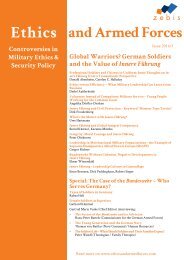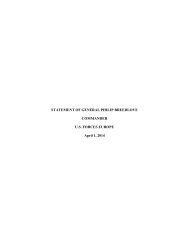FULLTEXT01
FULLTEXT01
FULLTEXT01
Create successful ePaper yourself
Turn your PDF publications into a flip-book with our unique Google optimized e-Paper software.
TACTICAL THOUGHT<br />
2014 September 29 th<br />
Irregular Warfare can thus challenge us to reconsider how we characterize war and<br />
peace, and can lead us to think about both constructions in more creative and<br />
imaginative ways. A key issue here is to what extent do our own western biases<br />
contribute to the fog of words and thought that seem to surround the term Irregular<br />
Warfare. Besides the apparent spaces of experiences and the horizons of expectations,<br />
there are obviously forces that come into play, in this case, unhinging an otherwise<br />
logically connection. I argue that social structures interpret actions, experiences and<br />
expectations, gains and losses and positions in social value structures.<br />
Decisions on horizons of expectations, such as strategy, not only decide outcomes in<br />
conflicts, they decide on what forms of violence that resources are directed towards.<br />
Such questions effect instant life, death, development or stagnation of different military<br />
systems and units, and thus lay the ground for tactical horizons of expectations. Once<br />
again, if we look at a summary of how Irregular Warfare can be described in broad<br />
terms, the horizons of expectations at the beginning of the 21 st century focusing on high<br />
technological warfare among states, and the spaces of experiences with legacies of<br />
Counterinsurgency from the 50s and 60s, it seems illogical. The empirical<br />
generalization can be discussed as follows. As a term, Irregular Warfare implies<br />
conflicts whose strategy, operational art and tactics focus on the lower end of the<br />
violence spectrum; subversion, terrorism, Guerrilla Warfare, but can also include more<br />
conventional forms of military operations and tactics.<br />
Violence is not restricted to the traditional military practices common to Western<br />
nations and states. Violence can take forms from and between non-state actors against a<br />
state. These conflicts can include Insurgency strategies, where the political and civilian<br />
elements are more important than military concerns and the will and support of the<br />
people can be of vital importance. What distinguishes Irregular Warfare can be argued<br />
to be the inventive intellectual use of limited physical military resources, parallel with<br />
hidden and subversive actions. Drivers are often the endurance and will of the people,<br />
extensive local knowledge and use of means hard to detect of organizing and carrying<br />
out operations and activities. Terrorism and subversion are key elements with the ability<br />
to identify and exploit what is culturally effective against the opponents. This can<br />
include criminal and illicit activities that fall outside of what is morally acceptable in<br />
Regular Warfare. Irregular Warfare relies on fluid, highly adaptable and flexible<br />
networks of influence groupings; ones that are often difficult for conventional military<br />
forces to detect, track and neutralize. This summary of an understanding of the traits of<br />
so-called Irregular Warfare becomes challenging when thinking of tactics.<br />
On the one hand, a social and military paradigm not any longer effective for<br />
contemporary conflicts, an unsatisfactory horizon of expectations, and on the other, a<br />
diffuse and shallowly researched and limitedly educated space of experiences. The stage<br />
for understanding and acting with tactics is new. However, ways to understand and<br />
explain phenomena in the world, even the military and political, have dynamics over<br />
time. The now widespread discussion of COIN, which did not exist before 2006, is a<br />
good example of this. Explanations and understanding related statements can be seen as<br />
constructions of words, given a certain meaning. These affect how we perceive the<br />
world and thus the knowledge which we consider important.<br />
53





